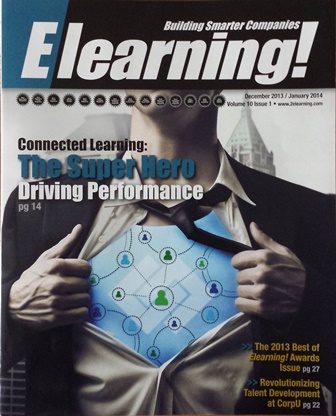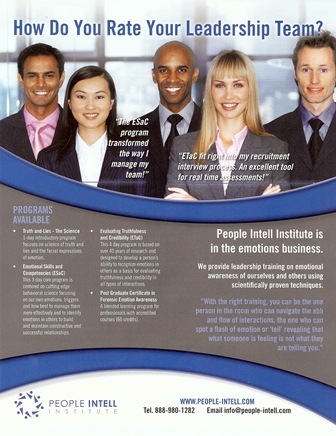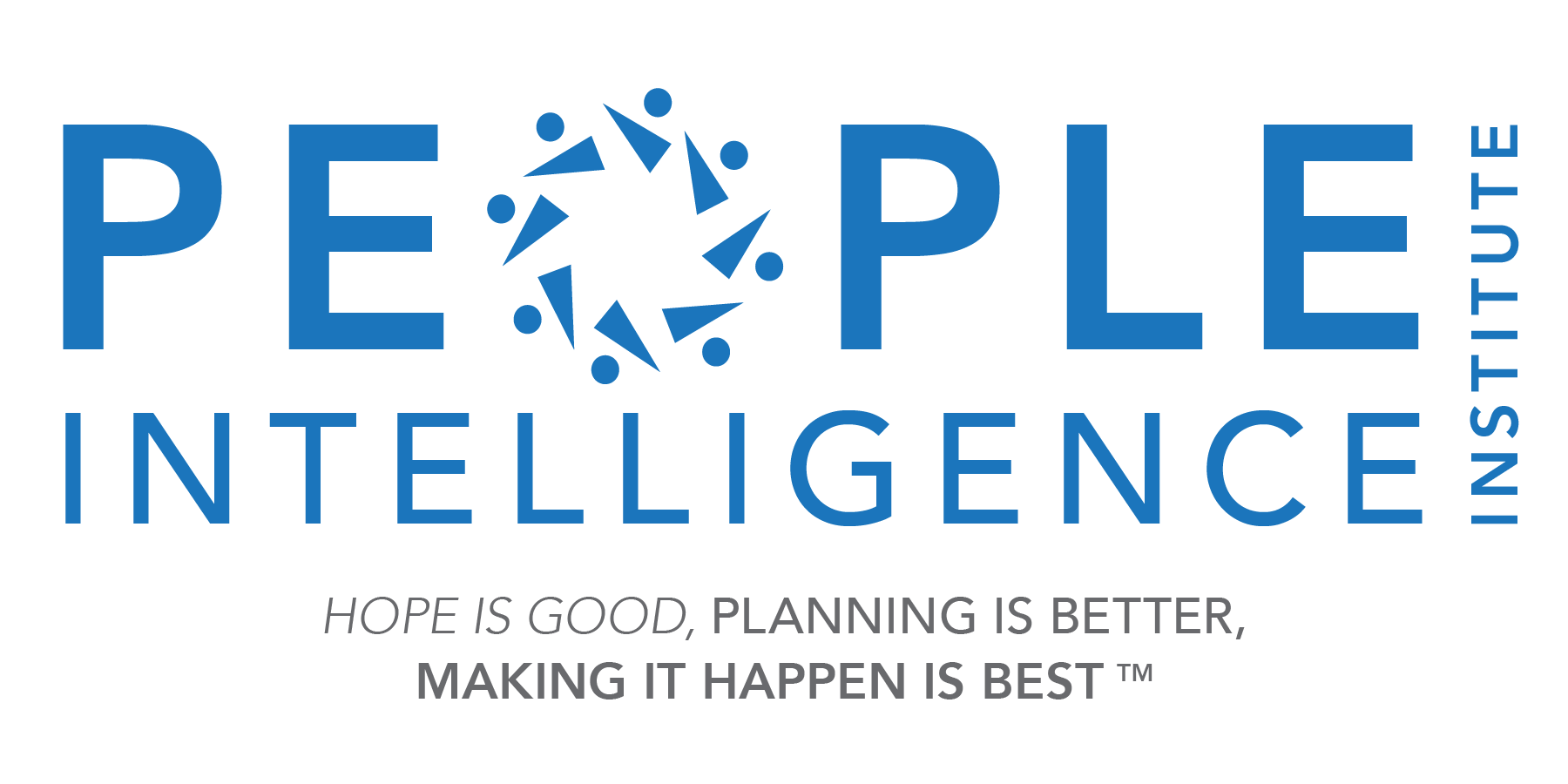"This course has helped train my eye and my mind to see more emotions in others, and as a result, have more successful interactions with others when they are emotional. I am more likely to notice things earlier, before escalation, when the potential to make better choices is stronger."
Read More
In August of 2013 People Intell had the privilege to speak at the Enterprise Learning! Conference and Expo held in Anaheim, CA. Our session was entitled "Lie To Me: The Science of Emotional Skills and Deception." We are happy to share with you our article that is featured in the December issue of Elearning! Magazine.
The Benefits of Truth within Leadership
The stakes are high. The truth is critical. What can you do to uncover it?
This denouement can play out across the spectrum of personal and professional human interactions. Just reading the words can trigger anxiety as you replay a time in your life when something mattered, when verity determined the difference between the winners and the also-rans.
Leaving aside the existential question of what truth is; we think we know it when it is before us in our everyday lives and we think we know when it's imperfect.
Truth is predicated on emotion. How does she really feel? What is his agenda? Is he listening to me? What is going on here that doesn't feel right? Why do they seem upset and where do we go from here? Why don't my employees communicate with me? How do I determine the truth?
The first step in finding the truth is to understand that emotions, those we reveal and those we try to suppress, are the drivers behind the behavioral and physiological manifestations that in some cases set off our internal alarms alerting us that something is amiss. We can learn to identify and interpret these cues more consistently and reliably to help us evaluate truthfulness.

The more you consider the possible applications for this skill, the more broadly you can relate its uses. To name just a few; imagine yourself managing a difficult team, hiring for a critical position, conducting an internal investigation, choosing a financial advisor, dealing with a complicated family matter, meeting new clients, or assessing the reaction of a focus group to new products.
This article is not about lying in a toxic sense but about the benefits of uncovering the truth of a situation. It's about personal or professional relationships and our ability to engage friends, employers, staff and counterparts honestly, perceptively and effectively. A person may have misgivings about absolute truthfulness for benign reasons. They may elect to mask their true feelings out of a sense of decorum, social norms, an unwillingness to hurt another's feeling, or as guided by context. The concept of dishonesty isn't always about trickery or malice.
The ability to discern the truth in a given situation has obvious advantages, but as a leadership trait, can be invaluable. A leader has the ability to recognize and manage not just his or her own emotions but also those of coworkers, competitors and employees. Executives with leadership presence have been shown to have high emotional intelligence or EQ, as outlined by Daniel Goleman in the Harvard Business Review.
How are emotions tied to deception and why are these concepts so inexorably linked? The full answer extends beyond the limits of this article but in short emotions tell us what matters, and the aforementioned is communicated in the form of expressions on our faces sometimes willingly and other times unwillingly with the world around us. Whether it is expressed openly, implied or repressed such as in the form of micro facial expressions, the cues are almost always there in front of us. Sensing it, recognizing it and functioning within the emotional underpinnings of it are crucial leadership skills. So how can we acquire or improve upon this ability?
We can learn the science of detecting the truth. Emanating from over 40 years of scientific research paired with real life application has illuminated that 5 channels of communication through which people express thoughts and feelings are key in detecting truth and assessing credibility. Underlying the 5 channels (face, body, voice, verbal style and words) is each individual’s baseline. In the context of deception, establishing a baseline is paramount. The baseline is how someone acts, reacts, speaks, gestures and generally interacts with others when they are in a relaxed state, unencumbered by a need to be deceitful about anything, irrespective of motivation. It's how they smile, stand, animate their faces, express ideas or move their hands when they speak. The trained observer, the leader, will be the one who recognizes what's swimming in the undercurrent. The person who understands how emotions instigate actions will bring the truth to the surface. It's why engaging coworkers is so critical to the success of your company.

How can you acquire what some have called "the leadership skill of the 21st century" and why is it so important to understand the science of deception?
"The ability to accurately detect deceit is real," says Paul Ekman, PhD, UCSF professor of psychiatry and principal investigator of a study published in Psychological Science in 1999. Ekman, who has been a leader in this field for decades, was able to demonstrate the role emotions play in deception. They are as inseparable as the water and the wet.
We can improve our odds by developing an understanding of the underlying emotions that precipitate deceptive behavior. The point is not to know the motivation for the deceit, but to know that it exists and to divine the truth which is often folded into emotion. The real goal is not to catch someone in a lie, but to elicit the truth about the situation in an engaging, intuitive, non-confrontational manner that serves the interests of all concerned.
Most importantly, emotional competencies will help managers bring employees back in to the fold, to make them feel a bigger part of the overall success of the mission. Harvard Business Review recently published findings from a Gallup survey that revealed up to 70% of workers are not engaged, meaning they simply don't care or are downright hostile towards employers. Although there are a host of reasons for this attitude, poor emotional intelligence by managers, directors and c-suite leaders prevents them from engaging employees positively, as part of the culture, rather than negatively, as in the dreaded performance review.
Wouldn't it be more efficient to avoid problems in the first place? Wouldn't employees who believe what they do matters be more likely to give a little extra, alert management to problems, interact with staff in a more honest way? Answer this simple question. Which mindset produces better results, a disengaged workforce or one that is self-determined, informed, worthy and relevant in the process?
Improving proficiency in two areas will propel you to a level beyond simply having people skills: emotional competence and detecting deception. With the right training, you can be the one person in the room who can navigate the ebb and flow of emotions, the one who can spot a flash of contempt, happiness, fear, anger, cynicism, sadness or other 'tells' that what someone is feeling is not what they are telling you. By learning to recognize the hidden emotions that leak out through non-verbal cues and micro-facial expressions, you can draw the honesty out of nearly any situation.


